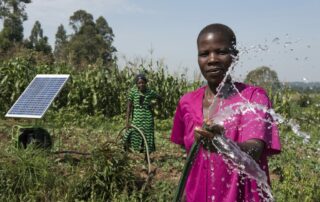The power of renewables: Productive use appliances as climate change solutions in sub-Saharan Africa
Sub-saharan Africa is globally the most vulnerable region to climate change. Factors such as structural weaknesses, governmental instability, and internal displacement makes Sub-Saharan Africa even more vulnerable to the impacts of climate change as the environmental degradation combined with extreme weather conditions, such as prolonged drought, put enormous stress on countries in the region. At the moment, 570 million people in the region (48 percent) lack access to electricity, while 900 million people (83 percent) lack access to clean cooking. Across the region, communities in low-income countries often have limited access to high-performing appliances for income generation and rely on traditional and dirty energy sources, like kerosene or diesel. In order to improve access to these essential services and build climate resilient societies, productive use appliances (PUAs) powered by renewable energy are an opportunity for community-based action. Ranging from solar water pumps for irrigation and cold storage for preservation of food to solar cookstoves and grain mills for small-scale food processing, PUAs could support the region’s transition towards low-carbon energy sources and contribute to the rise of productivity and residents’ incomes. This would be a good strategy to reinforce the local economy through the creation of new job opportunities and the improvement of livelihood and food security. Nonetheless, it is important to increase the levels of scalability of these programmes and ensure that PUAs reach a broader pool of users through results-based financing, grants, and subsidies and ad-hoc training courses to develop entrepreneurial and business skills. Photo Credit: Jeffery M Walcott/IWMI


